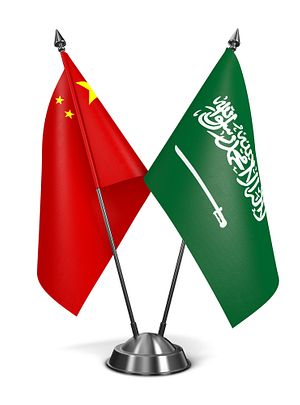Chinese President wrapped up his two-day visit to Saudi Arabia on Wednesday morning, making him the first president to visit the Gulf state since 2009.
Xi’s first visit to the Middle East, which began with his arrival in Riyadh on Tuesday, comes amid serious tensions between Saudi Arabia and Iran. After Saudi Arabia executed a prominent Shiite cleric earlier this month, protesters in Iran stormed the Saudi embassy. Riyadh then severed diplomatic relations with Tehran, and many of Saudi Arabia’s allies followed suit. China, which enjoys good relations with both of the Middle Eastern rivals, has had to walk something of a tightrope to keep from alienating either side.
Yet in a joint statement issued on Wednesday, China and Saudi Arabia both “stressed support for the legitimate regime of Yemen.” Saudi Arabia has been backing Yemeni President Abd-Rabbu Mansour Hadi against a revolution waged by Houthi rebels, who (as Shiites) are aligned with Iran. Xi’s first planned trip to the Middle East was cancelled over the Yemen issue – visiting Saudi Arabia (and not Iran) soon after Riyadh began air strikes in Yemen would have sent the wrong message.
However, China can get away with a reference to support for the “legitimate regime” of Yemen now for a couple of reasons. First, defaulting to support for an existing government against a rebellion is simply China’s modus operandi, based on its strong preference for stability as well as its own fear of domestic opposition. Second, and most crucially, China did not express support for Saudi Arabia’s use of force against the rebels; in fact, the joint statement went on to say that all sides in Yemen should avoid making decisions that increase chaos and further fracture the state.
A spokesperson for China’s Foreign Ministry clarified on Wednesday that China is looking to “promote peace talks in Yemen.” “It is hoped that Yemen would end conflicts, realize reconciliation, restore stability and achieve economic and social development at an early date,” spokesperson Hong Lei told the press.
Aside from the reference to Yemen, China largely stayed out of the Saudi-Iran fray during the first leg of Xi’s Middle East tour. Though China’s foreign ministry billed a recent visit to both states by Vice Foreign Minister Zhang Ming as an attempt to ease tensions, Beijing has traditionally shown no interest in playing peacemaker between Saudi Arabia and Iran (which would doubtless prove to be a thankless task). Instead, China separates out its bilateral relationships with both states from the tense geopolitical context, a strategy that has worked well over the past decades. Despite paying lip service to increasing cooperation with Saudi Arabia on regional issues in the joint statement, there’s no way Beijing could actually implement that goal without upsetting Iran – which is at loggerheads with Saudi Arabia on every major regional flashpoint, from Yemen to Syria.
Speaking of Syria, on that conflict (where China has been playing a more active role as mediator), both China and Saudi Arabia expressed concern over the situation and reiterated the need for a peaceful, political solution based on last year’s UN Security Council resolution.
On the bilateral front, China and Saudi Arabia elevated their relationship to a “comprehensive strategic partnership” and pledged more governmental exchanges and dialogues. Most notably, they agreed to set up a high-level committee that will coordinate bilateral cooperation. The only achievement in the security realm was a nod to increasing cooperation to fight terrorism.
Much of the rest of the joint statement covered various aspects of economic cooperation – for example, an agreement to advance free trade talks between China and the Gulf Cooperation Council. The two sides also eyed more cooperation on “industrial capacity,” with talk of boosting technology transfers, industrialization, and economic diversification.
Meanwhile, energy cooperation will continue to be the bedrock of China-Saudi cooperation. In the statement, China praised Saudi Arabia (Beijing’s largest provider of oil imports) for being a “safe, trustworthy, and dependable” oil source. Beyond oil, the statement spoke of increased cooperation on nuclear power and new energy sources.
China and Saudi Arabia also reiterated their intention to cooperate on China’s “Belt and Road” initiative. In particular, they will seek to advance infrastructure cooperation, with a focus on railways, roads and bridges, telecommunications, and ports.
Most of these points — industrial cooperation, “Belt and Road” projects, and increased energy ties — will be on the docket for Xi’s trip to Tehran as well. That’s the key to China’s goal of maintaining a balanced relationship with the two sides: stay neutral on regional issues, and keep bilateral relations chugging along at roughly the same rate.

































